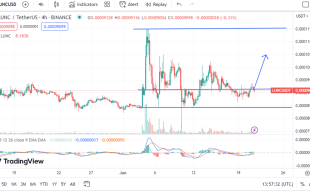Join Our Telegram channel to stay up to date on breaking news coverage
In a recent discussion, MoneyGram CEO Alex Holmes delved deep into the dynamic landscape of Ripple cross-border payments.
In the interview, Holmes focused on the fascinating intersection of MoneyGram and Ripple, two influential players reshaping the financial world.
This development comes amidst the legal battle between Ripple (XRP) and the US Securities and Exchange Commission, alleging Ripple conducted a $1.3 billion unregistered securities offering.
Alex Holmes Sheds Light On the Pros and Cons Of Ripple in Cross-Border Payment
In the interview session held by Fortune magazine, the CEO of MoneyGram, Alex Holmes, discussed the potential of Ripple and XRP in cross-border payments.
Holmes also talked about the opportunities and challenges associated with these technologies. He mentioned that the traditional banking system presents a significant hurdle for companies like theirs.
He added that they’re designed primarily to facilitate domestic payments and corporate transfers, which poses a central obstacle for remittance companies such as MoneyGram.
According to the interview report, MoneyGram saw crypto as the best possible solution after scouting various methods to decrease remittance costs.
Despite this, Holmes emphasized that the majority of users still exhibit a strong preference for fiat currency over cryptocurrencies. As a result, they are reluctant to hold digital assets.
According to the CEO, users often look for a seamless transition back into traditional currencies once they receive payments in cryptocurrency, highlighting the continued dominance of fiat currencies.
MoneyGram Faced Challenges While Integrating Ripple Solution
The Remittance Company had once tried to venture into Ripple’s solution but experienced some difficulties when converting XRP into local currencies. According to MoneyGram, integrating Ripple’s solution is not in line with their aim to reduce international remittance costs.
MoneyGram highlighted that forming alliances with exchanges and market makers incurred additional expenses for international remittances. This challenge shows the difficulty of moving from cryptocurrencies to regular money in cross-border payments.
However, in 2021, the partnership between Ripple and MoneyGram ended shortly after the U.S. SEC (a regulatory organization) took legal action against Ripple.
MoneyGram Continued Its Pursuit of Innovative Solutions, Despite These Challenges
Even though MoneyGram has faced obstacles, they have not given up on finding new and creative ways to improve their services.
Currently, they are working together with Stellar blockchain (using XLM) to make it easier for people to buy, store, and withdraw a stablecoin called USDC.
This collaboration aims to enhance the convenience and accessibility of digital currency transactions for MoneyGram users. Also, through this collaboration, MoneyGram targets to address individual needs in countries affected by inflation.
Individuals living in such regions can transfer their USDC backed by Stellar to their local currency when needed. Holmes’ interview underscores the continuous endeavors of remittance companies, including MoneyGram, in navigating the world of cryptocurrencies.
Read more:
- Ripple’s International Payment Network Could Come to Brazil
- Ripple CEO Slams SEC for Contradicting Crypto Regulations
Join Our Telegram channel to stay up to date on breaking news coverage


